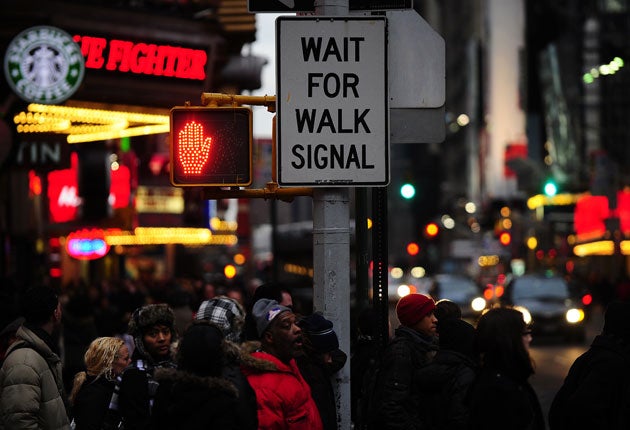David Randall: New York, New York – one helluva slow-moving town
Four corners of the world

Your support helps us to tell the story
From reproductive rights to climate change to Big Tech, The Independent is on the ground when the story is developing. Whether it's investigating the financials of Elon Musk's pro-Trump PAC or producing our latest documentary, 'The A Word', which shines a light on the American women fighting for reproductive rights, we know how important it is to parse out the facts from the messaging.
At such a critical moment in US history, we need reporters on the ground. Your donation allows us to keep sending journalists to speak to both sides of the story.
The Independent is trusted by Americans across the entire political spectrum. And unlike many other quality news outlets, we choose not to lock Americans out of our reporting and analysis with paywalls. We believe quality journalism should be available to everyone, paid for by those who can afford it.
Your support makes all the difference.New Yorkers have a reputation for busting about the place, barely tolerating anyone who gets in their way. Not for nothing is this the archetypal Manhattan gag – Tourist: "Excuse me, how do you get to Carnegie Hall?" New Yorker (without breaking step): "Practice, lady, practice." No nonsense, no niceties, no time – just rush, rush, rush.
It now gives me great pleasure to reveal that this picture of the pressured, high-speed metropolis may be mere myth. According to a study by New York's planning department, walkers there average a fraction under 3mph – considerably slower than the average adult pedestrian's pace of about 4.3mph.
This figure has surfaced in reports about ill-tempered confrontations between pedestrians in what New York media are calling "sidewalk rage", the latest in a long line of similarly identified modern behaviours such as "road rage", "air rage", "bike rage", "trolley rage", etc. These days, it seems, belligerence cannot simply be bad manners, but has to be granted the status of a quasi-condition, as if the cause were not a lack of self-control or consideration, but something external. It's also an attempt to make the trivial seem significant, an example of the dread influence of sociology whereby, in this case, a bit of commonplace argy-bargy is elevated into a social phenomenon.
The past had no need for similar categorisations, otherwise historians would be churning out books on such things as "sedan-chair rage", "cloister rage" and, from my parents' era, "antimacassar rage" – the annoyance caused by Brylcreemed men not using the things.
* An important part of the solution to African poverty is, you might think, building successful industries. Something, in fact, like Equatorial Guinea has done with oil, the extraction of which brings in $4bn a year to a country of just 650,000 people. These revenues are one reason why EG has, according to the CIA World Factbook, an average per capita income of US$37,900 (£23,315), almost identical to the level of wealth enjoyed by Belgians. Lucky old Equatorial Guineans, eh? Well, not quite. For such is the extent of corruption there that, while President Obiang is the eighth-richest leader in the world, all but a handful of the population are so poor that one in six children die before the age of five, and one in three people die before 40.
Mind, there are countries with worse records in child health. Angola has the world's worst infant mortality rate. And what else? A booming oil industry, producing more barrels than any other African country save Nigeria. These are things to remember the next time we hear from some corporate suit about how their investment is bringing wealth to some "poor" country.
* A sense of irony – or even of perspective – has never been a strong suit of the public relations industry. Even so, it was with some surprise that, as I pondered the present revolutionary spirit, fleeing presidents and potentates and their numbered bank accounts, what should drop into my inbox but a press release from VisitBritain. It announced its new drive to bring to the UK "High Net Worth individuals, wealthy people with more than $1m in disposable funds". If they are interested, our own Robert Fisk could provide the names of very wealthy men from north Africa and surrounding parts who may shortly need somewhere to go to at short notice.
* China's attitudes to freedom of information may still be what you could call a work in progress, but here is a small sign of change. A friend who runs a highly regarded training scheme in Britain told me that he had, on a recent course, the daughter of Beijing's chief censor. What was she training to be? A journalist.
Join our commenting forum
Join thought-provoking conversations, follow other Independent readers and see their replies
Comments